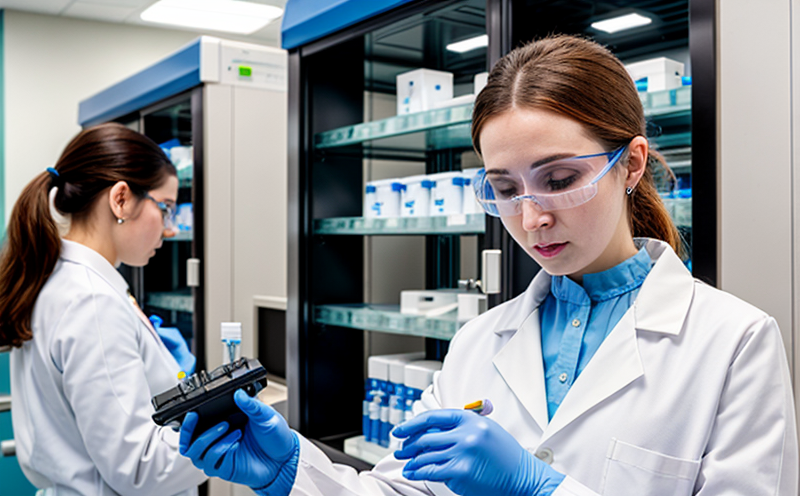Hormone Quantification Bioanalysis Testing
Hormone quantification bioanalysis testing is a critical component of pharmaceutical development and regulatory compliance. This service focuses on accurately measuring hormone levels in biological samples to ensure drug efficacy, safety, and adherence to international standards. In the pharmaceutical sector, particularly for biologics and small molecule drugs targeting hormonal pathways, precise hormone quantification can make or break clinical success.
The process begins with sample collection, which is critical as even minor contamination or handling errors can lead to inaccurate results. Samples are typically obtained from biological fluids such as blood plasma, serum, urine, or tissues. Once collected, these samples undergo rigorous pre-processing steps, including filtration and centrifugation, followed by protein precipitation or solid-phase extraction techniques.
The actual quantification process involves several steps that ensure accuracy and reliability. Chromatography, particularly liquid chromatography-tandem mass spectrometry (LC-MS/MS), is widely used for its high sensitivity and specificity. This method allows the separation of target hormones from other compounds in complex matrices. Post-separation, the ions of interest are detected by mass spectrometry, which provides a quantitative measure based on their characteristic mass-to-charge ratios.
Interference can be a significant challenge in hormone quantification due to potential co-eluting substances or matrix effects. To mitigate this, advanced calibration methods and internal standards are employed. These ensure that the analytical response is consistent across different samples. The use of certified reference materials (CRMs) further enhances accuracy by providing traceable calibrations.
Another key aspect of hormone quantification bioanalysis testing is the validation process. This involves demonstrating the method's precision, accuracy, linearity, and robustness over a specified range of concentrations. Compliance with standards such as ISO 15195-2 ensures that results are reliable and can be trusted for regulatory submissions.
The final step is the generation of a comprehensive report that includes all relevant data, including raw instrument outputs, calculated concentrations, and quality control metrics. This transparency allows stakeholders to make informed decisions about drug development or clinical trial design.
In summary, hormone quantification bioanalysis testing is not just about measuring hormone levels; it's about ensuring that these measurements are accurate, reproducible, and aligned with regulatory requirements. This service plays a pivotal role in the pharmaceutical industry by providing essential data for both R&D and compliance.
Eurolab Advantages
At Eurolab, we pride ourselves on delivering exceptional hormone quantification bioanalysis testing services. Our expertise is built on over two decades of experience in the pharmaceutical sector, ensuring that our clients receive reliable and compliant results.
Our state-of-the-art laboratory facilities are equipped with cutting-edge instrumentation, including advanced LC-MS/MS systems, which allow us to provide precise quantification even for trace levels of hormones. This ensures that we meet or exceed international standards such as ISO 15195-2 and ASTM E14501.
We have a team of highly qualified scientists with deep domain knowledge in bioanalytical testing. Their expertise is reflected in the rigorous quality control measures we implement at every stage of the process, from sample collection to final report generation.
Our commitment to excellence is further demonstrated by our adherence to strict ethical and confidentiality standards. We ensure that all client data remains secure and confidential throughout its lifecycle with us. This trust-building approach helps us maintain long-term relationships with our clients.
In addition, Eurolab offers flexible service packages tailored to meet the unique needs of each client. Whether you require routine testing or specialized analyses, we have a solution that fits your requirements.
Environmental and Sustainability Contributions
The pharmaceutical industry plays a crucial role in environmental stewardship, particularly through the efficient use of resources and minimizing waste. At Eurolab, our hormone quantification bioanalysis testing contributes positively to this mission by ensuring that only necessary samples are collected and processed.
We employ sustainable laboratory practices such as using eco-friendly reagents and optimizing our use of consumables. This reduces our environmental footprint while maintaining the highest standards of accuracy and reliability in our tests.
Our commitment to sustainability is further exemplified through our collaboration with clients on projects that aim to reduce waste and improve efficiency in their operations. By partnering with Eurolab, pharmaceutical companies can contribute to a more sustainable future without compromising on quality or compliance.
Competitive Advantage and Market Impact
Eurolab's hormone quantification bioanalysis testing service provides a significant competitive advantage by ensuring that our clients have access to the most accurate and reliable data. This is critical in an industry where even small discrepancies can lead to costly delays or failures.
Our expertise allows us to provide services that are not only compliant with international standards but also ahead of them. This foresight ensures that our clients stay at the forefront of innovation, enabling them to bring new and improved products to market more quickly.
The accuracy and reliability of our testing data can significantly impact clinical trial outcomes and regulatory submissions. By providing robust evidence, we help pharmaceutical companies secure approvals faster, reducing time-to-market and increasing their competitive edge.
In terms of market impact, our service contributes to the development of safer and more effective drugs. By ensuring that hormone levels are accurately quantified, we support the creation of treatments that meet strict regulatory requirements while also being safe for patients.
Moreover, our service supports the ongoing evolution of the pharmaceutical industry towards personalized medicine. Accurate hormone quantification is essential in tailoring therapies to individual patients, thereby enhancing treatment efficacy and patient outcomes.





